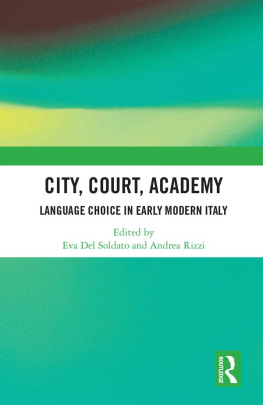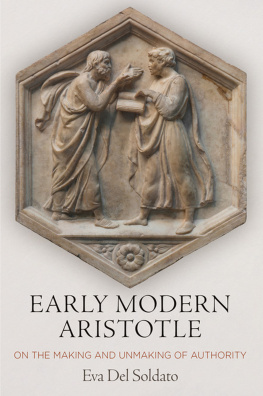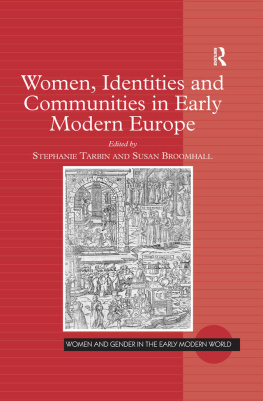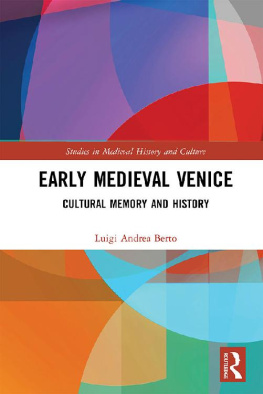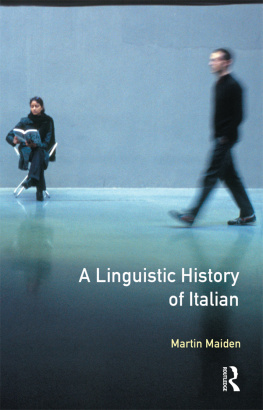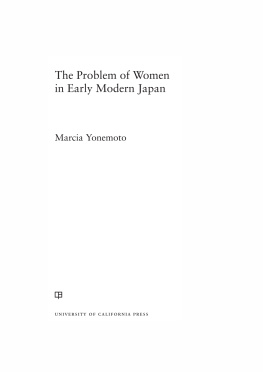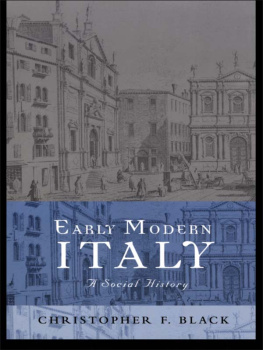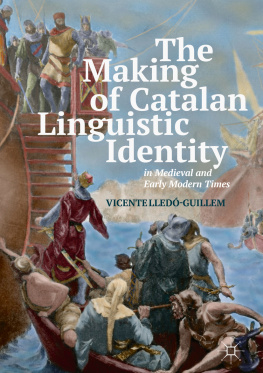City, Court, Academy
This volume focuses on early modern Italy and some of its key multilingual zones: Venice, Florence, and Rome. It offers a novel insight into the interplay and dynamic exchange of languages in the Italian peninsula, from the early fifteenth to the early seventeenth centuries. In particular, it examines the flexible linguistic practices of both the social and intellectual elite, and the men and women from the street.
The point of departure of this project is the realization that most of the early modern speakers and authors demonstrate strong self-awareness as multilingual communicators. From the foul-mouthed gondolier to the learned humanist, language choice and use were carefully performed, and often justified, in order to overcome (or affirm) linguistic and social differences. The urban social spaces, the princely court, and the elite centers of learning such as universities and academies all shared similar concerns about the value, effectiveness, and impact of languages. As the contributions in this book demonstrate, early modern communicators including gondoliers, preachers, humanists, architects, doctors of medicine, translators, and teachers made explicit and argued choices about their use of language. The textual and oral performance of languages and self-aware discussions on languages consolidated the identity of early modern Italian multilingual communities.
Eva Del Soldato is assistant professor in the Romance Languages Department at the University of Pennsylvania.
Andrea Rizzi is an Australian Research Council Future Fellow at the University of Melbourne.
City, Court, Academy
Language Choice in Early Modern Italy
Edited by Eva Del Soldato
and Andrea Rizzi
First published 2018
by Routledge
2 Park Square, Milton Park, Abingdon, Oxon OX14 4RN
and by Routledge
711 Third Avenue, New York, NY 10017
Routledge is an imprint of the Taylor & Francis Group, an informa business
2018 selection and editorial matter, Eva Del Soldato and Andrea Rizzi; individual chapters, the contributors
The right of Eva Del Soldato and Andrea Rizzi to be identified as the authors of the editorial material, and of the authors for their individual chapters, has been asserted in accordance with sections 77 and 78 of the Copyright, Designs and Patents Act 1988.
All rights reserved. No part of this book may be reprinted or reproduced or utilised in any form or by any electronic, mechanical, or other means, now known or hereafter invented, including photocopying and recording, or in any information storage or retrieval system, without permission in writing from the publishers.
Trademark notice: Product or corporate names may be trademarks or registered trademarks, and are used only for identification and explanation without intent to infringe.
British Library Cataloguing-in-Publication Data
A catalogue record for this book is available from the British Library
Library of Congress Cataloging-in-Publication Data
A catalog record for this book has been requested
ISBN: 978-1-472-46840-6 (hbk)
ISBN: 978-1-315-14624-9 (ebk)
Typeset in Sabon
by Apex CoVantage, LLC
Contents
EVA DEL SOLDATO AND ANDREA RIZZI
Part I
Speech in the city
ELIZABETH HORODOWICH AND ANDREA RIZZI
PETER HOWARD
LUCA BOSCHETTO
Part II
Textual authorities, innovations, and subversions
STEFANO U. BALDASSARRI
ANNA SIEKIERA
EVA DEL SOLDATO
AMY SINCLAIR
Part III
Beyond Latin: Greek, Hebrew, and Arabic
FEDERICA CICCOLELLA
CEDRIC COHEN SKALLI
MARIO CASARI
Stefano U. Baldassarri is director of the International Studies Institute in Florence (ISI Florence), where he has been professor of Italian literature for several years. After graduating from the Universit di Firenze in 1993, he received his PhD from Yale University in 1999. His research interests include medieval and Renaissance literature, translation studies, and philology. He has published essays in scholarly journals such as Archivio Storico Italiano, Interpres, Rinascimento, and Modern Language Notes. Moreover, he has edited critical editions of various humanist works, including Latin texts by Bruni, Loschi, Manetti, and Salutati. His latest monograph is entitled La vipera e il giglio. Lo scontro tra Milano e Firenze nelle invettive di Antonio Loschi e Coluccio Salutati (2012).
Luca Boschetto is an independent scholar. He took his PhD from the Scuola Normale Superiore in Pisa and has received fellowships from, among others, The Harvard University Center for Italian Renaissance Studies (Villa I Tatti) and the National Humanities Center (NC, USA). With research interests focusing on Italian humanism and on Florentine social and political history, he has produced studies of Leon Battista Alberti, the merchant court of Renaissance Florence, and literary production in fourteenth- and fifteenth-century Florence. He is the author of Leon Battista Alberti e Firenze: Biografia, storia, letteratura (2000) and Societ e cultura a Firenze al tempo del Concilio: Eugenio IV tra curiali, mercanti e umanisti, 14341443 (2012).
Mario Casari (PhD, 2001) is lecturer in Arabic and Persian languages and literature at the Italian Institute of Oriental Studies, Sapienza University of Rome. His research deals mainly with the circulation of texts and cultural relations between Europe and the Islamic world from late antiquity to the modern age, with a wide variety of approaches, presented in several publications and conferences. In 2011 he was awarded the Al-Farabi-UNESCO prize for his book Alessandro e Utopia nei romanzi persiani medievali. As a fellow at Villa I Tatti the Harvard University Center for Italian Renaissance Studies (2008/09) he engaged in research on Arabic and Persian studies in late Renaissance Italy.
Federica Ciccolella is professor of Classics at Texas A&M University. Her research focuses on the reception of the Classics in Byzantium (Cinque poeti bizantini, 2000) and the study of Greek during the Renaissance (Donati Graeci: Learning Greek in the Renaissance, Leiden 2008; Teachers, Students, and Schools of Greek in the Renaissance, coedited with Luigi Silvano, 2017). Her works include translations of Achilles Tatiuss novel (1999) and Procopius of Gazas letters (in Rose di Gaza, ed. by Eugenio Amato, 2010), as well as articles and essays on several aspects of Byzantine and Renaissance cultures.
Cedric Cohen Skalli teaches early modern and modern Jewish philosophy at the University of Haifa. His research focuses on the relationship of Jewish thinkers to two main philosophical shifts: the shift from Medieval philosophy to early modern thought (14th17th century), and the shift from early modern to modern thought (18th20th century). He has published three books and many articles on diverse aspects of Jewish thought and literature in the Renaissance and several essays on the question of translation in early 20th-century philosophy. He is also the translator of many works by Freud, Benjamin, Scholem, Idel, and Abravanel.
Eva Del Soldato is assistant professor of Romance languages at the University of Pennsylvania. She is the author of studies devoted to Renaissance thought and culture, with special attention to the Aristotelian and Platonic traditions in the European context. Among her publications, the monograph

